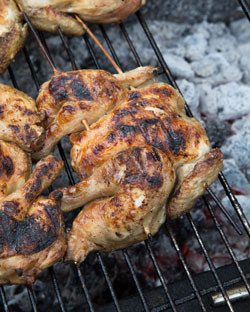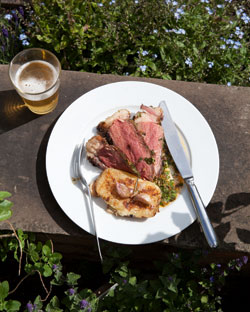Barbecue recipes


Roula Khalaf, Editor of the FT, selects her favourite stories in this weekly newsletter.
We had a bit of luck with this photo shoot. Not the least irksome aspect of the appalling weather has been the difficulty in presenting the fruits of our labours under a dark and gloomy sky. The barbecue shoot, twice postponed, looked like following the usual pattern. Andy’s app told him that heavy rain was 9.4 kilometres away and heading in our direction. Then, in the early afternoon, a small miracle happened. A pocket of blue sky revealed itself and the sun suddenly illuminated our efforts. So prolonged was this indulgence that we were able to finish our work, sit back with a glass of beer and tear into the little coquelets and beefsteak we had been salivating over for a couple of hours.
The fact is that most barbecues in Britain this year will probably enjoy similar conditions. Nobody likes dining al fresco more than us, but that is partly due to the frisson of excitement from knowing that it often has to be abruptly abandoned.
I prefer cooking outside, perhaps because it is so different from my professional environment. My barbecue, dragged each year from its increasingly bedraggled tarpaulin cover, is looking somewhat decrepit but it is an old friend of which I am very fond. Not the least of its merits is the system of shelving that allows me to raise the grills above the fire and moderate the heat as necessary. I am a great believer in wholehearted outdoor grilling without cheating: only the potatoes, garlic and fennel here have had any preliminary cooking in the kitchen and the remaining items are all the better for being cooked entirely al fresco.
It was my nephew – proprietor of the estimable Age & Sons in Ramsgate – who alerted me to the merits of fennel pollen, featured in the sea bass recipe. He had a number of exhausted-looking bronze fennel plants in his garden and simply reached out to pluck the pollen as a seasoning for his fish. Shortly afterwards, an Italian friend gave me a little pot of her own dried fennel pollen: since the fennel pollen season is even shorter than the English summer, it has served me well.
——————————————-
Whole sea bass with Florentine fennel, orange and fennel pollen
Your fishmonger should scale and gut the fish but I give instructions in the happy event of your having caught them, or bought them direct off the fisherman.
2 sea bass weighing 1.5kg each
6 heads Florentine fennel
3 oranges
A few sprigs of thyme
2 lemons
1-2 tsp fennel pollen
Olive oil
● Cut off the sharp dorsal fins from the fish. Grasp the fish by the tail and, using the back of a knife, a potato peeler or a proper scaling tool, holding the instrument almost at right angles to the fish, run it up towards the head, repeating the process until all the scales are removed. Make a small incision in the belly and detach the gut from the body. Grasp the gills with a cloth and pull the gills and guts behind up and out through the neck cavity. Run cold water through the fish to make sure it is completely clean. Light the barbecue.
● Remove and save the top fronds of the fennel and cut the bulbs into three or four slices, down through the base so that the slices remain in one piece. Place the slices in a steamer for seven to eight minutes so that they are just on the point of tenderness. Cut off the tops and bottoms of the oranges and remove the rest of the skin as though cutting away the staves of a barrel so that no pith remains. Cut the oranges into thin slices across the grain, removing any seeds as they emerge.
● Once the grill is very hot, quickly sear the fennel slices in a criss-cross pattern, cooking them on both sides. Remove to a plate and season with sea salt and pepper. Season the interior of the sea bass with crushed black pepper and sea salt and place a few sprigs of thyme in the interior along with a couple of slices of lemon. Rub the skin of the fish very lightly with olive oil and then place them in a clamp before setting down on the hot dry grill. Once the skin is nicely browned, turn the fish, and once this side is browned in turn lift them away from the fiercest heat. Turn occasionally and test for doneness with a skewer, which should glide easily through the flesh. The fish will take 15-20 minutes to cook.
● Place the fish on a platter and surround with the fennel and the sliced oranges. Sprinkle with a few more sprigs of thyme, the reserved fennel fronds and the pollen. Sprinkle the whole assembly with a little more sea salt and olive oil and present to the table with some lemon segments.
——————————————-
Grilled poussin, chilli and maple glaze

4 poussin or coquelet, weighing 800g-900g each
1 tbs sherry vinegar
1 tsp red chilli flakes
1 tsp sea salt
4 tbs maple syrup
1 lemon
● To spatchcock the birds, lift the skin off the neck cavity and scrape the wishbone with a small knife; detach it at the bottom and pull it clear. Take a heavy cook’s knife and insert it through the belly cavity all the way to the front, along one side of the backbone. Push down hard to cut through skin and bone. Place the knife on the other side of the backbone and cut through again so that the whole backbone can be detached. Spread the bird slightly on a chopping board, skin-side up, and push down hard in the middle with the palm of the hand, so the bird is spread out and presents a virtually flat surface. Run two skewers, one through wings and body, the other through legs, thighs and body, to keep the bird flat on the grill.
● Season them, brush the skin with olive oil and place skin-side down on a moderate fire. While they slowly colour, mix salt and chilli flakes with the sherry vinegar, then whisk in the maple syrup. After eight to 10 minutes the birds should be a lovely golden brown. Turn them over and brush the skin with the glaze. Continue cooking for a further 10 minutes, brush the skin with the marinade again and turn toward the grill. Taking care (the syrup will burn quickly), glaze the birds on the heat. Paint the underside of the birds and glaze this in turn.
● Place a skewer in the knee joint and make sure the juices run clear. Give a final glaze to the skin-side and remove to rest before serving with wedges of lemon.
——————————————-
Red onion salad with parsley and red wine vinegar
The sweetness of the grilled onions marries well with the rasp of the red wine vinegar.
1kg red onions
1 small bunch parsley
3 tbs good red wine vinegar
3 tbs olive oil
1 tbs capers
● Peel the onions and cut them into very thick slices (1cm) across the grain. Brush the slices with olive oil and place on the grill on a medium hot fire. Turn them when the slices are nicely browned with a hint of char from the barbecue and sear on the other side before lifting them a little way from the heat so that they cook until tender. Lift off the grill and pile into a bowl.
● Pick the parsley leaves off their stalks and rinse them in cold water and then dry. Dowse the onions in the vinegar and then add the parsley leaves, a good seasoning of sea salt and some olive oil. Toss the salad so that the onion rings separate. Sprinkle generously with capers and serve.
——————————————-
Grilled rib of beef chimichurri

This is a terrifically pokey sort of sauce to accompany well-charred beef.
1 rib of beef weighing a little under 1kg
4 cloves garlic
1 shallot
½ tsp sea salt
½ tsp paprika
2 tbs red wine vinegar
1 bunch parsley
1 small bunch oregano
2 tbs olive oil
● Bring the rib to room temperature, at least one hour before cooking. Once the barbecue is really hot but no longer smoking, season one side of the beef with coarse salt and plenty of ground black pepper. Place this side down on the hot grill close to the flame – it will need no oil – and watch carefully. Once nicely charred, lift the rib away and cook more gently for 3-4 minutes before seasoning the other side and searing that in turn.
● While the meat is cooking, pound the garlic and salt in a mortar. Chop the shallots finely and add them to the bowl together with the paprika. Pound together before adding the vinegar and then the picked, washed and chopped herbs. Continue to pound before adding the olive oil.
Once the beef is rare, cover the top surface with the sauce and lift the rib up above the barbecue so that it can rest gently to an even medium rare.
——————————————-
Potatoes with garlic and rosemary
The potatoes need to be cooked as long as possible without falling apart when sliced.
20 cloves garlic
1kg potatoes
Olive oil
Several sprigs rosemary
Smoked sea salt
● Separate the garlic cloves and cover with cold water. Bring to the boil and simmer for 10 minutes before refreshing in cold water and then threading on skewers. Cover the potatoes with cold water, add salt and bring to a simmer. Cook for 20 minutes so that the potatoes are almost cooked but still firm. Slice the potatoes into thick 1cm slices.
● Brush the potatoes with olive oil and place them on the grill. Distribute the garlic skewers around them and cook them evenly, turning them once, for some 20 minutes, strewing fresh rosemary leaves over the potatoes for the last five minutes. Place on a serving dish and season with the smoked sea salt.
——————————————-
Courgettes with feta, lemon and oregano

Grilling whole courgettes reveals real flavour in a now underrated vegetable.
1kg courgettes
100g feta cheese
2 lemons
A few sprigs fresh oregano or marjoram (mint could be used)
3 tbs olive oil
● Wash the courgettes in cold water, leaving them whole and with the stalk attached. Place them on the medium hot grill and char them gently on all sides and finish more gently away from the grill until they feel soft and cooked through.
● Cut the feta into small cubes of half a centimetre. Once the courgettes are cooked, split them lengthways and arrange on a serving dish, cut side up. Distribute the cut feta and oregano leaves over the courgettes and then finely grate the zest of the lemons on top. Squeeze the juice of the lemons and add a sprinkling of olive oil. The salty cheese should be sufficient seasoning for the courgettes.
——————————————-
Letter in response to this article:
Whatever is a ‘pokey sort of sauce’? / From Ms Caroline Delval
Comments